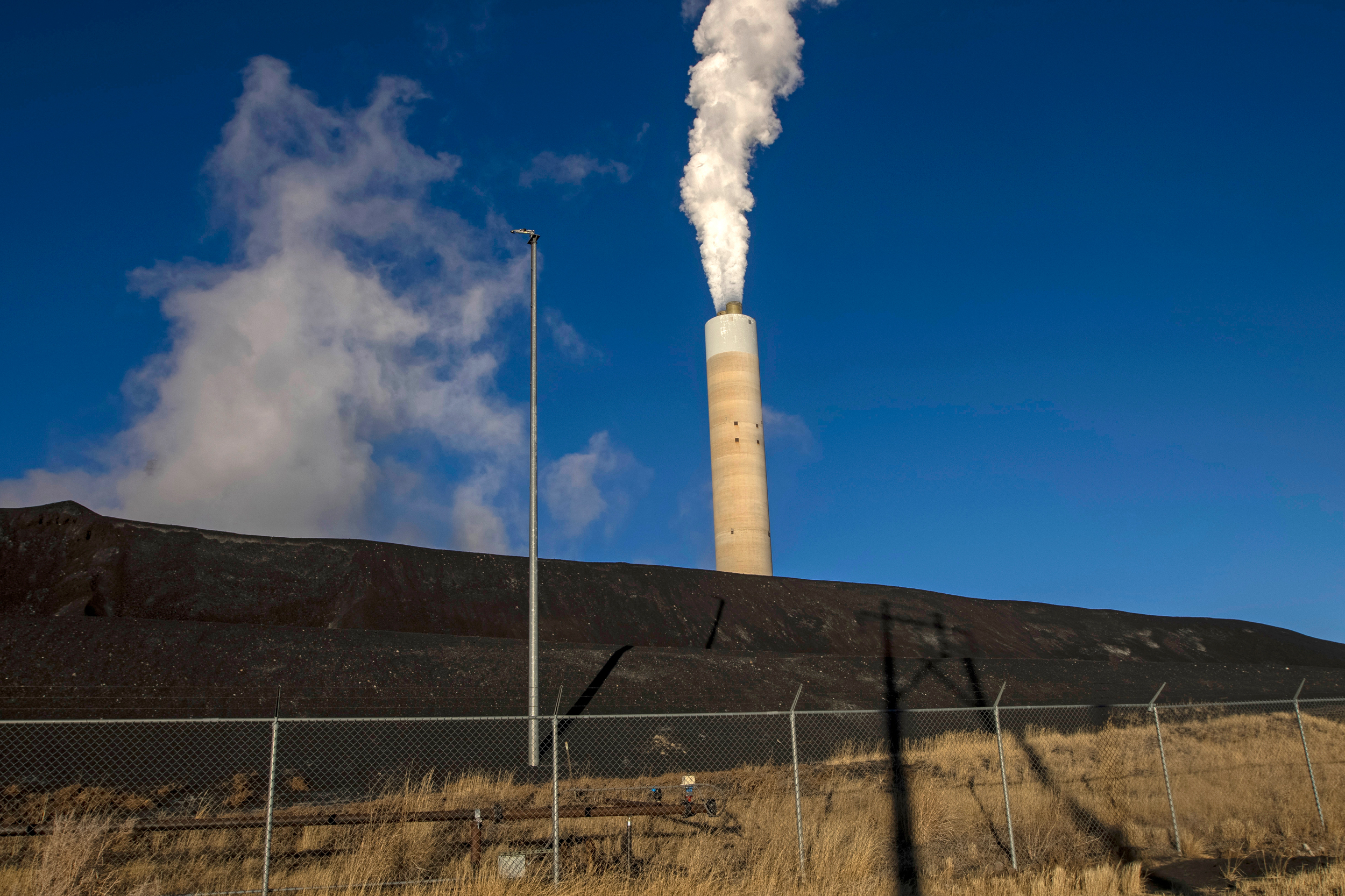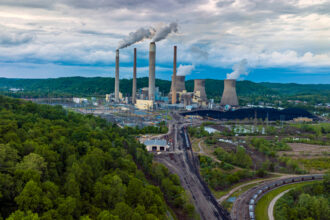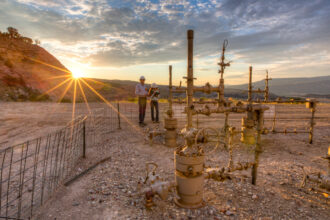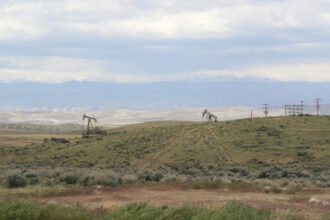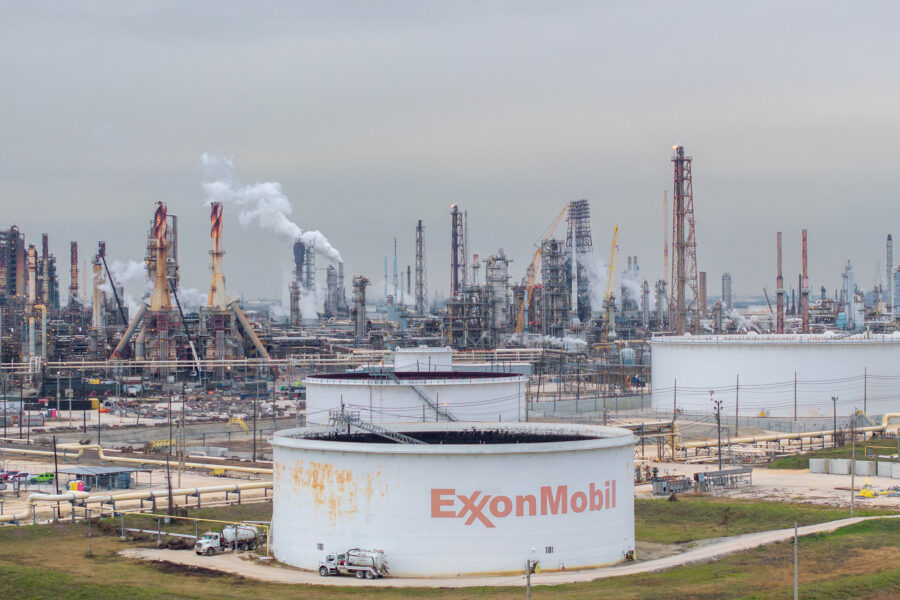President Donald Trump has made reviving the coal industry a political and policy priority in his second term, swimming against the current of a domestic—and international—market that’s increasingly turned away from the fuel source. A Wednesday hearing of the House Natural Resources Subcommittee on Energy and Mineral Resources, on two bills aiming to bolster the U.S. coal industry, showcased the debate around the use of federal lands, the nation’s energy future and the fate of the world’s oldest fossil fuel.
During the hearing, Republican lawmakers lauded coal as indispensable to U.S. energy security and blasted federal oversight as a bureaucratic chokehold suffocating the mining industry. Democrats and environmental groups dismissed the bills as a symbolic and misguided attempt to rescue U.S. coal production, arguing that the policies would fail to revive jobs and succeed only in worsening emissions and undermining progress on climate policy.
“We’re seeing a complete cognitive dissonance,” Cameron Walkup, a legislative representative for environmental law nonprofit Earthjustice, told Inside Climate News. “These two bills are designed to ignore the coal industry’s impacts on communities and the environment, and instead just prop up a failing industry.”
The Combating Obstruction Against Leasing, or COAL Act of 2025 (H.R. 280) cements a streamlining of the approval of federal coal leases and overrides the Obama administration’s 2016 moratorium on new coal leases. During Trump’s first term, Interior Secretary Ryan Zinke revoked the order, but the 2025 version of the COAL Act goes further by nullifying it and aims to prevent any future administrations from restoring the moratorium or similar leasing halts.
Rep. Harriet Hageman (R-Wyo.), who introduced the COAL Act, emphasized Wyoming’s dominant role in coal—her state has led U.S. coal production for years, accounting for around 40 percent of the nation’s supply—and criticized the uncertainty created by the Obama and Biden administrations’ leasing pauses.
“When the federal government tries to destroy Wyoming’s coal industry, it ends up turning the lights out and the heat off in America,” Hageman said.
Bill Would Let Coal Projects Skip Environmental Studies
The second bill under debate Wednesday would amend the landmark 1970 National Environmental Policy Act (NEPA), a legal backbone of federal environmental protections. The Streamlining NEPA for Coal Act (H.R. 4068), creates new exemptions for coal projects, regulatory shortcuts that could allow coal projects to bypass standard environmental reviews.
“What was once meant to be a tool for reasonable oversight has become a weapon used to block development, delay jobs and drive up costs,” said Rep. Mike Collins (R-Ga.), who sponsored H.R. 4068. “This is simply not sustainable if we want to remain an energy-producing nation.”
Collins characterized NEPA as a “maze of reviews, red tape and litigation” that had caused “paralyzing delays” by mandating environmental studies, a process he called “outdated.”
“This is about cutting delays, not cutting corners,” Collins said. “Coal has powered this nation for generations … but without reform, the regulatory burden will continue to strangle the industry.”
For environmental policy advocates like Walkup, who described NEPA as “the environmental Magna Carta,” the law may be old, but it’s become a more critical protection for American communities.
“Coal mines have enormous environmental impacts, from the greenhouse gas emissions that are warming our climate to the impact on local water resources,” Walkup said. “Allowing these kinds of projects to just completely skirt environmental review is incredibly damaging.
“Coal continues to be in decline, and little tweaks of regulatory policies aren’t going to change the market dynamics, but they still have significant negative impacts for the communities that are burdened with these projects,” he added.
Steve Feldgus, a former senior Interior official under the Biden administration, testified before the subcommittee that gutting NEPA would backfire. “Environmental reviews are not what’s slowing mining projects down—community opposition is. When we eliminate opportunities to address opposition constructively … we simply force it into courtrooms.”
Feldgus said bypassing NEPA environmental reviews and engagement with affected communities would “take potential collaboration and turn it into confrontation, and instead of partners, we create plaintiffs.
“Projects don’t succeed because we add more shortcuts to the process. They succeed because agencies doing the permitting have the resources they need to do the job properly, and they succeed because they earn community trust and support,” he said.
Congressional Efforts Align with Administration’s Broader Goals
Trump’s assault on climate policy in his second term has included gutting regulatory agencies and research, killing renewable power projects, firing National Parks and Forest Service employees, encouraging drilling on federal lands and rescinding rules that lower pollution and protect Americans’ health.
Adam Suess, the acting assistant secretary for lands and minerals management at the Department of the Interior, made clear during the hearing that the Trump administration sees both bills as essential.
“We are working steadfastly and tirelessly to implement the president’s energy dominance agenda, which is central to the country’s economic, national and energy security. Each of the bills advanced at today’s hearing further that agenda,” Suess testified. “As President Trump has reaffirmed, American coal plays a pivotal part in our economy. It will continue to power the country for many decades to come.”
Calling Suess’ testimony an attempt to “deflect,” Rep. Yassamin Ansari (D-Ariz.) said “it is undeniable that the cheapest form of energy is wind and solar, and yet this administration is waging war against renewables while making every attempt to prop up dirty, expensive coal.”
Suess pushed back against criticisms of coal’s economic feasibility and harm to the environment. Suess said renewables, like wind and solar, are “seven, eight, nine, 10 times as expensive as coal and natural gas,” adding that “technological advances in burning coal make it incredibly clean, and so there’s no downside in my view.”
That claim is at odds with a recent report, which found solar and wind remain the cheapest sources of electricity, even without subsidies. Financial advisory firm Lazard, in an analysis published last June, determined that “utility-scale solar and onshore wind remain the most cost-effective forms of new-build energy generation on an unsubsidized basis.”
“Coal had its time and place, it powered the Industrial Revolution—thank you, coal!—but we are long past steam engines now.”
— Rep. Jared Huffman (D-Calif.)
Several Republicans used their questioning to underscore coal’s importance to their states and constituents. Rep. Jeff Crank (R-Colo.) warned that closing coal plants prematurely would burden his state’s households. “Analysis has shown in Colorado that shutting down coal plants will increase Colorado utility bills by $75 a month,” Crank said. “Affordable and reliable energy must remain accessible to everyone, and coal continues to be one of the cheapest and most dependable base load power sources in our country.”
Democrats argued that while affordability and energy production should be top concerns for legislators, the new bills focused on coal were a step in the wrong direction.
“These bills won’t bring those factories back, just as the giveaways for coal and bills on the agenda won’t make coal dominant again,” Rep. Jared Huffman (D-Calif.) said. “Coal had its time and place, it powered the Industrial Revolution—thank you, coal!—but we are long past steam engines now.
“Coal is simply too expensive and destructive to continue propping it up.”
How Trump’s Agenda Is Already Affecting Coal Mining
With Republicans in control of the House, the bills are likely to move out of committee. But even if the new laws don’t pass the Senate, the Trump administration is already reshaping coal policy.
The bills debated Wednesday largely codify or overlap with elements of Trump’s coal policies already enacted through executive orders or provisions of the One Big Beautiful Bill Act (OBBBA) passed in July. That law, Trump’s most significant domestic policy achievement since returning to office, notably accelerated the phase-out of wind and solar tax credits, reducing federal incentives for renewables while extending new support for coal.
This story is funded by readers like you.
Our nonprofit newsroom provides award-winning climate coverage free of charge and advertising. We rely on donations from readers like you to keep going. Please donate now to support our work.
Donate NowAlan Zibel, a research director at D.C.-based public advocacy group Public Citizen, told Inside Climate News that “reopening the formerly resolved question on coal’s future is one of the most damaging things Trump has done so far.”
“This administration is determined to give fossil fuel interests everything they want, including and especially the dirtiest industry—coal—in deliberate ignorance of the fact coal doesn’t make any economic sense anymore,” Zibel said. “Coal is not the future of American energy, and no amount of subsidies or giveaways or regulatory favors will change that.”
The OBBBA, alongside executive orders, also extended production tax credits for metallurgical coal—the variety used in steelmaking— and reclassified it as a “critical material.”
Zibel said that move, in particular, sparked genuine confusion among climate advocates, including him and his colleagues. “Metallurgical coal has been a dead issue; it’s what the environmental community worked on a decade ago. Everyone’s moved on.”
“We can’t build the economy of the future by clinging to the dirty technologies of the past,” he added.
Chelsea Barnes, director of government strategy for environmental advocacy group Appalachian Voices, said that while metallurgical coal has been a “lifeline for the industry” in West Virginia, the new tax credits won’t overcome the damage other Trump policies have already done to mining. “Who’s going to buy this coal?” Barnes asked rhetorically. “The tariffs have shut down the sales pipelines that were kind of available to them.”
Barnes said the Trump administration’s wave of new policies has hurt the coal industry in Appalachia more than it has helped. Around 700 miners and others who work in the industry have been laid off this summer alone in West Virginia. Barnes attributed those layoffs to a drop in demand and price for metallurgical coal stemming from Trump’s tariffs. “But I don’t know that you’ll hear a coal company say that, because they don’t want to speak ill of President Trump,” Barnes added.
Barnes said demand for metallurgical coal also dropped when Trump cut numerous planned infrastructure projects, including development tied to the Biden administration’s 2022 Inflation Reduction Act. “If the Trump administration and Republicans were actually interested in seeing a resurgence in domestic manufacturing and metallurgical coal mining, they wouldn’t be gutting these new clean energy and infrastructure programs,” she said.
Coal miners themselves have also suffered from Trump’s cutbacks, according to Barnes.
“They’ve fired employees at the Mine Safety and Health Administration and the National Institute for Occupational Safety and Health that administer black lung programs and keep miners safe, gutting their budgets. They’re trying to create this resurgence of coal while killing all the protections for the miners they supposedly want those jobs for,” Barnes said. “There’s a bit of hypocrisy there.”
About This Story
Perhaps you noticed: This story, like all the news we publish, is free to read. That’s because Inside Climate News is a 501c3 nonprofit organization. We do not charge a subscription fee, lock our news behind a paywall, or clutter our website with ads. We make our news on climate and the environment freely available to you and anyone who wants it.
That’s not all. We also share our news for free with scores of other media organizations around the country. Many of them can’t afford to do environmental journalism of their own. We’ve built bureaus from coast to coast to report local stories, collaborate with local newsrooms and co-publish articles so that this vital work is shared as widely as possible.
Two of us launched ICN in 2007. Six years later we earned a Pulitzer Prize for National Reporting, and now we run the oldest and largest dedicated climate newsroom in the nation. We tell the story in all its complexity. We hold polluters accountable. We expose environmental injustice. We debunk misinformation. We scrutinize solutions and inspire action.
Donations from readers like you fund every aspect of what we do. If you don’t already, will you support our ongoing work, our reporting on the biggest crisis facing our planet, and help us reach even more readers in more places?
Please take a moment to make a tax-deductible donation. Every one of them makes a difference.
Thank you,


